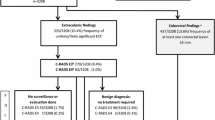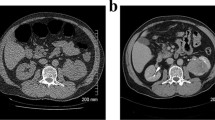Abstract
Background
This study aimed to retrospectively assess the accuracy of minimal preparation computed tomography (MPCT) in the detection of colorectal cancer (CRC) within the frail and elderly population and to evaluate the relevance of extra-colonic findings (ECF).
Methods
Radiology reports, clinical notes and follow-up reports from 207 patients who underwent MPCT to investigate for CRC between 2005 and 2009 were analysed. Patients were scanned following the administration of oral contrast for 48 h, without bowel preparation or colonic insufflation. MPCT results were measured against patient outcomes, with a minimum of 2 years of follow-up.
Results
Twelve cases of clinically relevant CRC were confirmed (5.8 %). MPCT correctly identified 11 of these lesions (sensitivity 91.6 %). Thirty-one patients had a possible CRC identified by MPCT, which was not confirmed by further examination (specificity 84.1 %). This results in a positive predictive value of 26.2 % and a negative predictive value of 99.4 %. Five of the patients with colon cancer underwent curative surgery. Sixty-eight clinically relevant ECF were confirmed, including 14 previously undiagnosed extra-colonic malignancies. ECF were considered to account for the presenting complaint in 15.0 % (31/207) of all patients.
Conclusions
Minimal preparation computed tomography is an effective and reliable investigation for the exclusion of clinically relevant CRC in this population. It provides clinicians with a valuable and pragmatic alternative to colonoscopy and CT colonography when invasive examination or cathartic bowel preparation will be poorly tolerated and small polyps are of limited significance. MPCT has an advantage over purely luminal imaging in the detection of extra-colonic pathology and appears to have an equally important role in the detection of CRC.


Similar content being viewed by others
References
Shellnut JK, Wasvary HJ, Grodsky MB, Boura JA, Priest SG (2010) Evaluating the age distribution of patients with colorectal cancer: are the United States Preventative Services Task Force guidelines for colorectal cancer screening appropriate? Dis Colon Rectum 53:5–8
Office for National Statistics. Cancer Statistics registrations: registrations of cancer diagnosed in 2007, England. http://www.statistics.gov.uk/statbase/Product.asp?vlnk=8843. Accessed 2010
Lukens FJ, Loeb DS, Machicao VI, Achem SR, Picco MF (2002) Colonoscopy in octogenarians: a prospective outpatient study. Am J Gastroenterol 97:1722–1725
Beloosesky Y, Grinblat J, Weiss A, Grosman B, Gafter U, Chagnac A (2003) Electrolyte disorders following oral sodium phosphate administration for bowel cleansing in elderly patients. Arch Intern Med 163:803–808
Tinetti ME, Stone L, Cooney L, Kapp MC (1989) Inadequate barium enemas in hospitalized elderly patients. Incidence and risk factors. Arch Intern Med 149:2014–2016
Yoong KK, Heymann T (2005) Colonoscopy in the very old: why bother? Postgrad Med J 81:196–197
Jensch S, Bipat S, Peringa J et al (2010) CT colonography with limited bowel preparation: prospective assessment of patient experience and preference in comparison to optical colonoscopy with cathartic bowel preparation. Eur Radiol 20:146–156
Lipscomb G, Loughrey G, Thakker M, Rees W, Nicholson D (1996) A prospective study of abdominal computerized tomography and colonoscopy in the diagnosis of colonic disease in an elderly population. Eur J Gastroenterol Hepatol 8:887–891
Ng CS, Doyle TC, Pinto EM et al (2002) Evaluation of CT in identifying colorectal carcinoma in the frail and disabled patient. Eur Radiol 12:2988–2997
Robinson P, Burnett H, Nicholson DA (2002) The use of minimal preparation computed tomography for the primary investigation of colon cancer in frail or elderly patients. Clin Radiol 57:389–392
Ozel B, Pickhardt PJ, Kim DH, Schumacher C, Bhargava N, Winter TC (2010) Accuracy of routine nontargeted CT without colonography technique for the detection of large colorectal polyps and cancer. Dis Colon Rectum 53:911–918
Domjan J, Blaquiere R, Odurny A (1998) Is minimal preparation computed tomography comparable with barium enema in elderly patients with colonic symptoms? Clin Radiol 53:894–898
Ganeshan A, Upponi S, Uberoi R, D’Costa H, Picking C, Bungay H (2007) Minimal-preparation CT colon in detection of colonic cancer, the Oxford experience. Age Ageing 36:48–52
Kealey SM, Dodd JD, MacEneaney PM, Gibney RG, Malone DE (2004) Minimal preparation computed tomography instead of barium enema/colonoscopy for suspected colon cancer in frail elderly patients: an outcome analysis study. Clin Radiol 59:44–52
Koo BC, Ng CS, U-King Im J, Prevost AT, Freeman AH (2006) Minimal preparation CT for the diagnosis of suspected colorectal cancer in the frail and elderly patient. Clin Radiol 61:127–139
Slater A, North M, Hart M, Ferrett C (2012) Gas insufflation of minimal preparation CT of the colon reduces false-positives. Br J Radiol 85:346–350
Bowles CJ, Leicester R, Romaya C, Swarbrick E, Williams CB, Epstein O (2004) A prospective study of colonoscopy practice in the UK today: are we adequately prepared for national colorectal cancer screening tomorrow? Gut 53:277–283
Rabeneck L, Davila JA, El-Serag HB (2003) Is there a true “shift” to the right colon in the incidence of colorectal cancer? Am J Gastroenterol 98:1400–1409
Radiation Protection Division of Health Protection Agency. http://www.hpa.org.uk/ProductsServices/Radiation/. Accessed 2010
Stryker SJ, Wolff BG, Culp CE, Libbe SD, Ilstrup DM, MacCarty RL (1987) Natural history of untreated colonic polyps. Gastroenterology 93:1009–1013
Guillou PJ, Quirke P, Thorpe H et al (2005) Short-term endpoints of conventional versus laparoscopic-assisted surgery in patients with colorectal cancer (MRC CLASICC trial): multicentre, randomised controlled trial. Lancet 365:1718–1726
Schwenk W, Haase O, Neudecker J, Muller JM (2005) Short term benefits for laparoscopic colorectal resection. Cochrane Database Syst Rev 3:CD003145
Hemandas AK, Abdelrahman T, Flashman KG et al (2010) Laparoscopic colorectal surgery produces better outcomes for high risk cancer patients compared to open surgery. Ann Surg 252:84–89
Clinical Outcomes of Surgical Therapy Study Group (2004) A comparison of laparoscopically assisted and open colectomy for colon cancer. N Engl J Med 350:2050–2059
Acknowledgments
We would like to thank the employees of the Department of Radiology, Kings Mill Hospital (Sutton in Ashfield), for their support with data collection. Also, we thank Janet Yates, Research Fellow at the Queen’s Medical Centre (Nottingham), for the initial analysis of data.
Conflict of interest
None.
Author information
Authors and Affiliations
Corresponding author
Rights and permissions
About this article
Cite this article
Saunders, J.H., Miskovic, D., Bowman, C. et al. Colorectal cancer is reliably excluded in the frail and elderly population by minimal preparation CT. Tech Coloproctol 18, 137–143 (2014). https://doi.org/10.1007/s10151-013-1045-4
Received:
Accepted:
Published:
Issue Date:
DOI: https://doi.org/10.1007/s10151-013-1045-4




